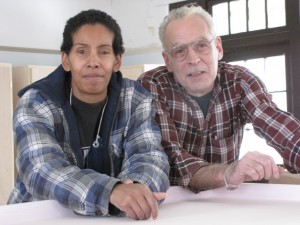
A warm, comfortable house, a car in the driveway and money for vacations, iPads and Uggs are not part of the equation for the homeless. The Crash of 2008 has found few immune from its consequences and those in need have been hit hardest of all.
But there are rays of hope in pockets throughout the region, and HONOR (Helping Others Needing Our Resources) is one of them.
The Emergency Housing Group, based on the grounds of Middletown”™s Psychiatric Center, is just one of many programs run on the large campus, offering services that run the gamut from the Cornell Cooperative Extension to housing for the homeless.
John Harper, EHG”™s executive director, and retired transit worker Bob Massaro wanted to find a way to give the homeless a skill, some self-esteem and enjoy the feeling of independence by offering a training program. Since Massaro”™s forte is carpentry, HONOR enrolled eight students from the emergency housing program last August and Massaro started teaching the basics.
It has blossomed into more than just a training program that lasts eight weeks ”“ both Harper and Massaro hope the HONOR program will become self-sufficient, providing well-constructed furniture made by people who never knew the talent they had until they had the opportunity to learn.
The program is funded by Orange County”™s Employment and Training Administration, which sets aside $50,000 a year annually. The Bank of America Foundation has also given the HONOR program needed funds to buy the wood and carpentry tools.
“I have never been so excited about anything in my life,” Massaro said. “When we started, there was a bit of resistance from a few of the students. They didn”™t see the point in it. But after they started working with tools and seeing a piece of wood become a bed, a cabinet, a nightstand or even using bits and pieces to create a magazine rack, they got interested. It wasn”™t just about learning a skill anymore. It was about feeling good about having a reason to get up in the morning and being part of something positive. They don”™t want to leave ”“ and I don”™t want them to ”“ unless it”™s because they”™ve gotten a job.”
The furniture is designed for institutional use, he said. “It”™s built to take a licking. And our carpenters put their heart in their work and care about making a quality product because it is a sense of accomplishment for them. They enjoy coming here and when the eight-week training program is over, they don”™t want to leave.
“The truth is, I don”™t want them to leave, either. For these people who as a result of one misfortune or another have ended up homeless, it is a way to become self-sufficient and give them self-esteem. We hope this program generates enough income to create real jobs and opportunities.”
Forty-year-old Racqule Smith was one of Massaro”™s first students. “Racqule has been such an asset that we”™ve hired her as an assistant,” Massaro said. For Smith, “It meant getting my own apartment again, for myself and my two children. It means feeling like a person again.
“I never had any kind of real training and worked mostly in retail. When those jobs dried up, I fell behind in my bills and my children and I ended up homeless. Thanks to HONOR having faith in me and the skills I learned from John, I have a job and my own apartment again. I know how hard it is to get a job, especially these days. It”™s a great feeling to leave here at the end of the day and go to a real home of my own. I know I”™m not alone in wanting to feel good about what I do.”
Massaro loves what he does and it shows and the time he gives the HONOR program isn”™t costing the taxpayers a dime.
“I don”™t know who gets more out of this ”“ me or the trainees who come to class. I do know I”™d like to see our well-made furniture get some exposure. We are strictly word of mouth, but we are trying to get the word out so we can really make this a program that is self-sufficient and provides jobs and training. Anyone coming here to see our furniture sees the skill and craftsmanship that goes into every piece we produce. Now, our next challenge is to get people who run group homes, housing for students and other institutions come up and see just what a fine line of furniture we”™ve created.”
To visit HONOR and view the furniture available, contact John Harper at (845) 343-7115.


















